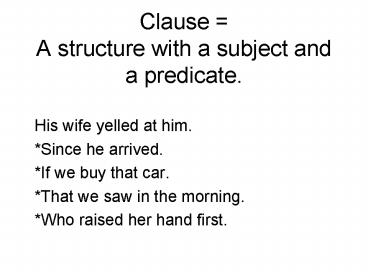Clause A structure with a subject and a predicate' - PowerPoint PPT Presentation
1 / 23
Title:
Clause A structure with a subject and a predicate'
Description:
If we buy that car. Relative = begins with a Relative Pronoun. *That we ate in the morning. ... 'I will buy the car if I can afford it.' 'Though they mistrusted ... – PowerPoint PPT presentation
Number of Views:60
Avg rating:3.0/5.0
Title: Clause A structure with a subject and a predicate'
1
Clause A structure with a subject and a
predicate.
- His wife yelled at him.
- Since he arrived.
- If we buy that car.
- That we saw in the morning.
- Who raised her hand first.
2
Types of Clauses
- Independent (Main)
- His wife yelled at him.
- Dependent
- Since he arrived.
- If we buy that car.
- That we ate in the morning.
- Who raised her hand first.
3
Types of Dependent Clauses
- Subordinate begins with Subordinator.
- Since he arrived.
- If we buy that car.
- Relative begins with a Relative Pronoun.
- That we ate in the morning.
- Who raised her hand first.
4
Types of Sentences
- Simple a single independent clause.
- His wife yelled at him.
- Compound two or more independent clauses.
- His wife yelled at him and the children laughed.
5
- Complex
- one IC at least one DC.
- His wife yelled at him because he wrecked the
car. - His wife, who he loved dearly, yelled at him
because he wrecked the car.
6
- Compound-Complex
- two or more ICs at least one DC.
- His wife, who he loved dearly, yelled at him and
his children laughed because he wrecked the car,
and the dog that he had rescued from the pound
barked loudly.
7
Subordinate Clauses
- usually adverbial
- modify the verb or the entire IC.
- When I get home, we will discuss the matter.
- I will buy the car if I can afford it.
- Though they mistrusted him, they gave him their
money.
8
Coordinating Conjunctions vs. Subordinators
- Coordinating Conjunctions and, but, or, nor,
for, so, yet - Subordinators are moved with the clause.
- When I get home, we will discuss the matter.
- We will discuss the matter when I get home.
9
- Subordinating Conjunctions must be connected to
an IC. - I will buy the car if I can afford it.
- I will buy the car. If I can afford it.
- Coordinating Conjunctions may be connected to
an IC with - a comma.
- I would enjoy the car, but I cannot afford it.
- I would enjoy the car. But I cannot afford it.
- Conjunctive Adverbs cannot be connected to an
IC. - I would enjoy the car, however I cannot afford
it. - I would enjoy the car. b, I cannot afford it.
10
Punctuation of Subordinate Clauses
- Separate clauses with a comma only if subordinate
clause comes first. - If I can afford it, I will buy the car.
- I will buy the car if I can afford it.
11
Diagramming Adverbial Subordinate Clauses289-290
12
Diagramming Adjectival Subordinate Clauses, p. 291
13
291 Ex. 9.5 Diagramming
14
Relative Clauses
- Relative Pronouns who, whom, whose, which,
that - He took the piece of candy that I
- wanted.
- Relative Adverbs when, where, why
- You can probably guess the reason why
- I am late.
15
- Sometimes, a relative pronoun serves as the
subject of the DC - I found the book that was lost.
- I found the book. The book was lost.
16
- Sometimes, the relative pronoun serves as the
object of the clause - I bought the book that we discussed yesterday.
- I bought the book. We discussed the book
yesterday.
17
- Sometimes, the relative pronoun serves as the
object of a preposition within the clause - My uncle bought the store in which your brother
works. - My uncle bought the store that your brother works
in. - My uncle bought the store. Your brother
works in the store.
18
pp. 297-298 How to diagram relative clauses
with relative pronouns.
19
p. 306 How to diagram relative clauses with
relative adverbs.
20
- When and where can be subordinators or relative
adverbs. How can you tell which it is? - Can it be moved with the clause?
- Is it adjectival or adverbial?
- We will discuss this when I get home.
- When I get home, we will discuss this.
- We were talking about the meeting where Susan
yelled at Bill. - Where Susan yelled at Bill, we were talking
about the meeting.
21
Grammar Issues with Relative Clauses
- who/whom
- prepositions at the end of sentences.
- This is the girl to whom I gave my ring.
- This is the girl whom I gave my ring to.
- This is the girl who I gave my ring to.
- This is the car in which I will drive to the
wedding. - This is the car that I will drive to the
wedding in.
22
The Omission of Relative Pronouns
- I just dented the car that my father bought
yesterday. - I just dented the car my father bought
yesterday. - This is the girl I gave my ring to.
- This is the car I will drive to the wedding in.
23
Punctuation of Relative Clauses
- Separate the relative clause by comma(s) only if
it is nonrestrictive (the clause does not change
the meaning of the NP that it modifies). - My sister who is pregnant will visit us for
three months. - My sister, who is pregnant, will visit us for
three months.































